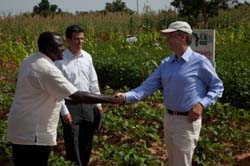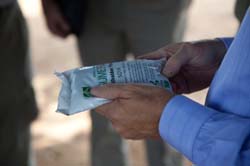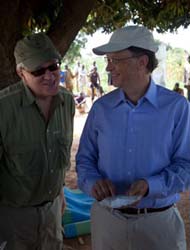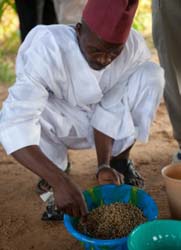Wednesday, 28th September 2011, was a big day for N2Africa when Bill Gates, Co-Chair of the Bill & Melinda Gates Foundation, visited one of the project’s soybean-inoculant demonstration sites in Kano State, Nigeria. Mr Gates was accompanied by Jeff Raikes, the foundation’s Chief Executive Officer, Sam Dryden, Director of Agricultural Development, and Prem Warrior, Senior Project Officer with specific responsibility for N2Africa,. The team was received by the N2Africa Nigeria Coordinator, Dr Abdullahi Bala. The visit lasted for about an hour during which Dr Bala described how N2Africa works with farmers to improve productivity in smallholder farms and enhance the livelihoods of farm households. He explained that Kano State is the most populous state in Nigeria, commonly with household sizes of more than 15 relying on land holdings of 1 to 1.5 ha. Despite the widespread poverty in the region, it serves as the food basket of the country as well as the neighbouring countries of Niger, Chad and Cameroun. Hence it is imperative to improve crop productivity (yield per unit area).
 |
 |
 |
| NIGERIA / Kano / 28 September 2011 Bill Gates arriving at IITA’s test sites at Bichi on 28 September 2011. Greeting Bill Gates is Dr. Abdullahi Bala. | Bill Gates and Jeff Raikes arriving and being greeted at IITA’s test sites at Bichi on 28 September 2011. They were accompanied by Sam Dryden (not seen) of the foundation | Bill Gates holding a packet of incoulant while being briefed by IITA staff during the visit to IITA’s N2Africa test sites at Bichi on 28 September 2011 |
N2Africa works with farmers to improve productivity in smallholder farms through the increased cultivation of legumes, mainly soybean, cowpea and groundnut. Land in the area is largely owned and managed by men and the project addresses this obvious gender imbalance in the communities by organising training for women on food processing for income and enhanced household nutrition. This training provides direct access to local markets for the women. Farmers were provided with seeds of improved varieties, phosphate fertilizers and rhizobial inoculants. The farmers are in return expected to give back 2 kg for every 1 kg of seed given, which will allow for new farmers to be provided with seeds in the following year.
 |
 |
Left:
Bill Gates and Jeff Raikes examining a packet of inoculant while being briefed by IITA staff during their visit to IITA’s N2Africa test sites at Bichi on 28 September 2011
Right:
Farmer Usman Ahmadu demonstrates how an inoculant is used while Bill Gates and Jeff Raikes (both not seen) watch during their visit to IITA’s N2Africa test sites at Bichi on 28 September 2011
|
The Bill & Melinda Gates Foundation leadership were shown customised packets of inoculants, seeds and fertilizer that the project provides farmers. Malam Usman Ahmadu, the lead farmer in charge of the demonstration plot, demonstrated to the visiting team how soybean seeds are inoculated after which he gave explanation on the various treatments on display. The demonstration plot was divided into four sub-units, each of 15 m x 10 m. One sub-plot that served as the control was treated with neither inoculant nor fertilizer; the next plot was treated with inoculant only and the third with phosphate fertilizer only. The fourth sub-plot was treated with both inoculant and phosphate fertilizer. Dr Bala further explained that the demonstration had 4 objectives: (i) to demonstrate to farmers that soybean could be cultivated in the area in spite of the relatively short cropping season. The benefit of growing soybean is that it diversifies the cropping system and source of income to the farmer, has residual benefit to the soil, helps in controlling “witchweed” - the parasitic plant Striga - and provides fodder for livestock. (ii) that proper crop management is a key requirement for good crop performance; (iii) to demonstrate the benefit of inoculant; and (iv) demonstrate that the inoculant only works well if the plant is given adequate amount of phosphate fertiliser. The visitors were fascinated by the striking difference between soybean plants treated with and without phosphate fertiliser and inoculants and the fact that the inoculant constitutes a small fraction of the total cost of inputs. In response to a question on the source and availability of the inoculants, Dr Bala explained that inoculants are currently not produced in Nigeria; the one used by the project was imported from Legumefix in the UK as a necessary step to start the inoculant demonstration with high quality products. However, N2Africa is currently in consultation with an entrepreneur that has indicated interest to set up an inoculant manufacturing plant in Nigeria by 2013. The demonstration was capped with an explanation on nodule colour and distribution in response to inoculation. There was a lot of animated discussion on the economics of soybean production and profitability relative to maize production. Later in the day at IITA’s office, N2Africa’s Farm Liaison Officer, Ms Esther Chinedu, exhibited a range of food products made from soybean by a women group working with the project.
